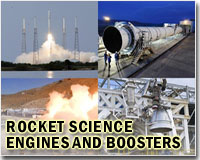 |
Pasadena CA (JPL) Dec 10, 2010 Less than three years after obtaining college degrees, a group of early-career employees at NASA's Jet Propulsion Laboratory, Pasadena, Calif., can now add "rocket launch" to their resumes. Recent graduates who work for JPL launched a sounding rocket 120 kilometers (75 miles) above Earth's surface on Monday, Dec. 6. The rocket flew from the U.S. Army's White Sands Missile Range in New Mexico, with four cameras on board. The cameras recorded real-time ground imagery throughout the flight, both after launch as the rocket climbed beyond the atmosphere, and during its descent back to White Sands. Those data will be compared with existing maps to develop terrain-modeling algorithms. This project will improve precision landing for future missions to Mars and other locations. Members of the Phaeton group, a rapid-training program for early career hires at JPL, submitted a proposal to NASA's Hands-on-Project Experience. The program, created by NASA in November 2008, aims to give rising engineers, scientists and others the opportunity to move a small mission from concept to launch to post-flight analysis. In May 2009, the Phaeton group was selected to move forward with their proposed project, called Terrain Relative Navigation and Employee Development, which they refer to as Trained. "The best thing about the Phaeton program is taking a project from the idea to launch and taking ownership of the decisions," said Elvis Merida, the Trained mission assurance manager. "I'm always making a conscious effort to educate myself, which is why I applied for the Phaeton program." Merida, who received a bachelor's and master's degree from California State University, Northridge, is currently working toward a second master's degree, in electrical engineering, from California State University, Los Angeles. The Phaeton program consists of about 40 early career hires at JPL working on three small-payload projects with a life cycle of about two to three years. Each team member is matched with an experienced JPL mentor to guide in technical and leadership development skills. "The program was designed for early-career hires, but I'm actually learning from it," said Johnny Kwok, who oversees the grads as Phaeton program manager at JPL. "Through their eyes, I'm learning about what they're experiencing, and they have the opportunity to touch all the pieces of the life development process." With the Dec. 6 launch, the Trained program participants have completed this portion of the early-career hire experience and will move on to other career opportunities at JPL. When asked if he feels a sense of relief from completing such an important and demanding project, Merida said, "I don't feel relief. I feel as though I'm just beginning."
Share This Article With Planet Earth
Related Links Trained project Rocket Science News at Space-Travel.Com
 Russia probes navigation system spending after crash
Russia probes navigation system spending after crashMoscow (AFP) Dec 7, 2010 Russia launched a probe Tuesday into whether the money assigned to create a satellite navigation rival to the US GPS system was being wisely spent, prosecutors said, after the latest launch ended in failure. The decision followed the failed launch Sunday of three Glonass satellites that were to have completed a satellite constellation whose development had been begun by the Soviet Union back ... read more |
|
| The content herein, unless otherwise known to be public domain, are Copyright 1995-2010 - SpaceDaily. AFP and UPI Wire Stories are copyright Agence France-Presse and United Press International. ESA Portal Reports are copyright European Space Agency. All NASA sourced material is public domain. Additional copyrights may apply in whole or part to other bona fide parties. Advertising does not imply endorsement,agreement or approval of any opinions, statements or information provided by SpaceDaily on any Web page published or hosted by SpaceDaily. Privacy Statement |